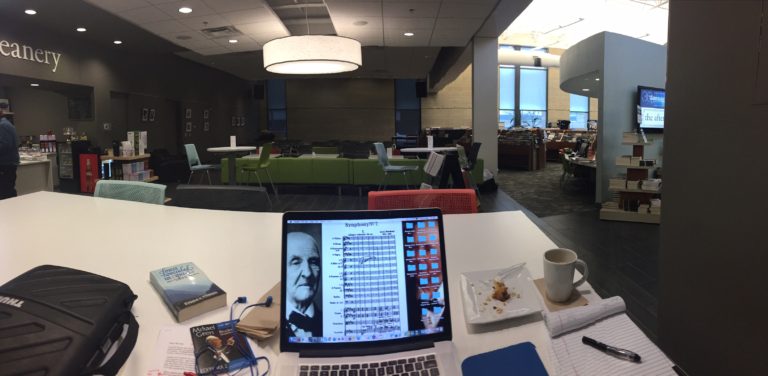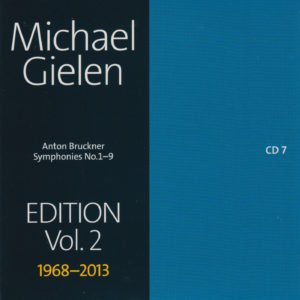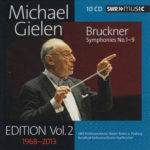
If this blog were a TV series, I’d be celebrating my 100th episode today. There would be cake. And the entire cast. And the media. Cameras. Maybe a few hangers on and groupies. Maybe a few actor-wannabes sprinkled among the throng.
For I’ve been blogging every day for 100 days, which deserves a “Huzzah!” just for that…don’t you think?
However, instead of the aforementioned cast party, cake, and groupies, I’m sitting by myself at Baker Book House, drinking a delightful Sumatra coffee and eating one of the most delicious scones I’ve ever had the pleasure to consume – a cranberry almond creation so unbelievably moist it tastes more like pastry than a scone.
So, that’s how I’m celebrating today – with coffee and a scone.
 This morning’s conductor of Anton Bruckner’s Symphony No. 7 in E Major (WAB 107) is German-born Michael Gielen (1927-).
This morning’s conductor of Anton Bruckner’s Symphony No. 7 in E Major (WAB 107) is German-born Michael Gielen (1927-).
The orchestra is SWR Sinfonieorchester Baden-Baden und Frieburg.
I first encountered Maestro Gielen on Day 4 of my 144-day project, Symphony No. 1.
Then again on Day 20, Symphony No. 2.
And again on Day 36 Symphony No. 3.
And again on Day 52, Symphony No. 4.
And again on Day 68, Symphony No. 5.
And, most recently, on Day 84, Symphony No. 6.
Today is the seventh time I’m listening to one of Maestro Gielen performances.
 From what I recall, my interest in Mr. Gielen has been hot and cold – mostly cold.
From what I recall, my interest in Mr. Gielen has been hot and cold – mostly cold.
But I’ll reserve the subjective stuff for later.
First, the objective aspects of this recording.
Bruckner’s Symphony No. 7 in E Major (WAB 107), composed 1881-1883
Michael Gielen conducts
Gielen chose the “Original Version 1883” (according to the CD sleeve)
SWR Sinfonieorchester Baden-Baden und Frieburg plays
The symphony clocks in at 58:32
This was recorded in Baden-Baden, Germany on December 15, 16, 1986
Gielen was 59 when he conducted it
Bruckner was 59 when he finished composing it in 1883
This recording was released on the SWR Music label
Bruckner wrote his symphonies in four parts. The time breakdown of this one (Symphony No. 7 in E Major, “Original Version 1883”), from this particular conductor (Gielen) and this particular orchestra (SWR Sinfonieorchester Baden-Baden und Frieburg) is as follows:
I. Allegro moderato…………………………………………………………………………18:05
II. Adagio. Sehr feierlich und sehr langsam…………………………………..19:34
III. Scherzo. Sehr schnell…………………………………………………………………9:32
IV. Finale. Bewegt, doch nicht schnell……………………………………………11:18
Total running time: 58:32
According to its entry on Wikipedia,
1883 version
This was the version performed at the work’s premiere. Unfortunately it survives only in one autograph copy which includes later changes by Bruckner and others, so the exact contents of this version are lost. This version is unpublished.
If the Wiki entry is true, what is Gielen using as the score for this performance?
Now, the subjective aspects.
My Rating:
Recording quality: 3
Overall musicianship: 3
CD liner notes: 4 (short essays on the Michael Gielen Edition, Bruckner’s symphonies, and the orchestra, translated into English and German)
How does this make me feel: 3
This is a solid performance in which I can close my eyes and get swept away.
It doesn’t particularly move me, though. Not to the point of awe. Or tears. It’s just a very fine performance.
Of particular interest to me was the Adagio, which Gielen and the SWR Sinfonieorchester Baden-Baden und Frieburg turn into an extravaganza for the ears.
Also, the Wagnerian Scherzo was nicely done, too. Kept me hooked.
I’m not sure I’d recommend Maestro Gielen’s interpretation to newbies, however. I wouldn’t not recommend it. If someone wanted to know what Bruckner’s Seventh sounded like, I see no problem pointing him/her to Gielen’s interpretation. It would easily suffice as an introduction.
But if I wanted to turn people on to something really inspired, I’d probably not hand this CD to them.
